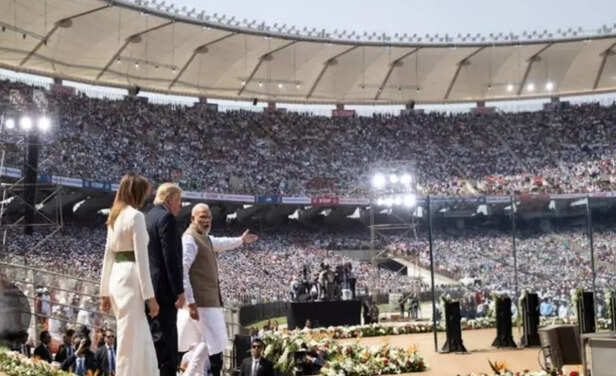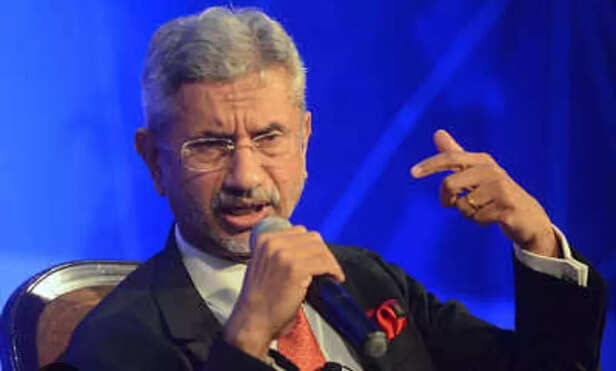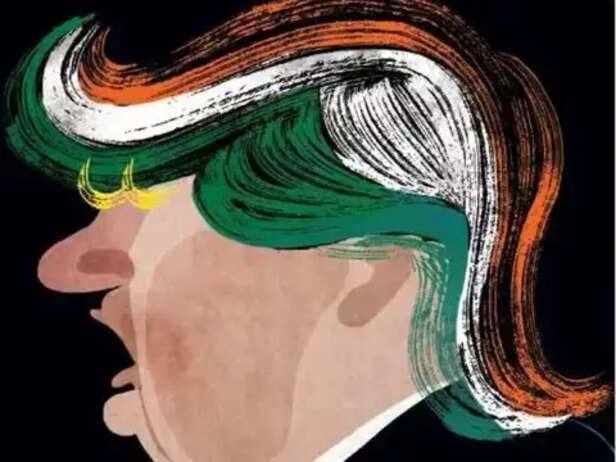Indians Favoured Donald Trump Over Joe Biden—But at What Cost?
Ankit Gupta | May 28, 2025, 15:42 IST
Significant number of Indian Americans supported Donald Trump. Many were swayed by his apparent rapport with PM Modi (remember the “Howdy Modi” and “Namaste Trump” events), tough stance on China, and perceived clarity on Islamic extremism. However, politics is not personal—Trump's America First policy was always transactional. Indian American support didn't translate into tangible pro-India policy outcomes.
There’s an old saying in diplomacy: “Nations have no permanent friends or enemies, only permanent interests.” Few relationships exemplify this more sharply than the recent rollercoaster between India and the United States under Donald Trump. While many Indian Americans rallied behind Trump—mistaking his bravado and photo-ops for authentic alliance—India paid a subtle but serious price for that misplaced faith. Now, with Trump preparing for a political comeback and making bold claims about mediating peace in global flashpoints from South Asia to Eastern Europe, India must confront an uncomfortable but necessary truth: no foreign power will ever protect India’s interests better than India itself.

From the grand “Howdy Modi” event in Houston to the jubilant “Namaste Trump” spectacle in Ahmedabad, the optics of U.S.-India camaraderie under Trump’s presidency were dramatic. Indian Americans—particularly from Hindu, business, and upper-middle-class segments—gravitated towards Trump in 2016 and 2020. Many admired his hardline stance on China, anti-radical Islam rhetoric, and personal rapport with Prime Minister Narendra Modi. On the surface, it felt like a geopolitical love story.
But the gap between public warmth and private policy quickly became evident.
Despite all the pomp, Trump’s administration made no structural changes that permanently benefited India. Tariff tensions escalated. Indian H-1B visa holders faced stricter scrutiny. And worst of all, Trump's sudden claim in 2019 that Prime Minister Modi had asked him to mediate on the Kashmir issue was not just false—it was a diplomatic bombshell.

In July 2019, during a press conference with Pakistan’s Prime Minister Imran Khan, Trump made a stunning statement:
“I was with Prime Minister Modi two weeks ago, and he actually said, ‘Would you like to be a mediator or arbitrator?’ I said, ‘Where?’ He said, ‘Kashmir.’”
That single sentence set off a firestorm.
India’s position on Kashmir is clear, consistent, and constitutionally anchored: it is a bilateral matter between India and Pakistan—with no role for third-party mediation. This is not a policy nuance. It is a red line. By implying otherwise, Trump directly contradicted decades of Indian diplomacy and risked internationalizing an internal matter.
India’s Foreign Minister S. Jaishankar responded firmly on the floor of Parliament:
“I would like to categorically state that no such request has been made by the Prime Minister to the US President.”
It wasn’t just a denial. It was a rebuke.
Why would a self-proclaimed “friend of India” create confusion around one of the most sensitive issues in Indian foreign policy?

More disturbing than the lie was the subtext of the claim: that India and Pakistan are equal stakeholders needing external supervision.
This is offensive on multiple levels.
India is a democratic republic, with constitutional protections, active institutions, and a growing economy. Pakistan, on the other hand, remains a military-dominated state, repeatedly accused of funding and sheltering terrorists—including those behind the 26/11 Mumbai attacks, the Pathankot assault, and the Pulwama bombing.
Can a responsible global leader genuinely see both nations as comparable? Or was Trump simply playing his old game of “deal-making” without understanding the emotional and political gravity of Kashmir?
The truth is, Trump has always viewed diplomacy through the lens of transaction, not trust. And in that lens, India was a pawn, not a partner.
Trump’s Kashmir gaffe was not an aberration. It was an extension of the traditional U.S. strategy: balancing powers, not befriending nations.
This is not about Trump alone. It’s about a deep-rooted American diplomatic posture—one that seeks leverage more than loyalty.

From Korea to the Kremlin, Trump has declared himself the ultimate dealmaker. His summit with North Korea’s Kim Jong-un, the so-called Abraham Accords in the Middle East, and his frequent claims about being able to end the Russia-Ukraine war “in 24 hours” reflect a consistent pattern: high drama, low detail.
When Trump claimed credit for an India-Pakistan ceasefire—again, without New Delhi’s confirmation—he inserted himself into a conflict with zero understanding of regional history. Foreign Minister Jaishankar once again had to indirectly correct him by saying:
“India was doing what it had to do. We were not influenced by external pressures.”
That’s diplomacy-speak for: “Stay out of our business.”
Trump’s repeated need to act as a global mediator reflects not statesmanship, but a narcissistic urge to be the center of every story.
India cannot afford such misjudgments. In a world increasingly defined by unpredictability and realpolitik, dependence is vulnerability.
This doesn’t mean India should abandon global engagement. On the contrary, it must build deeper relations with nations that respect Indian interests, not just exploit them. But the core philosophy must change—from alignment to autonomy.
That includes:
It is time to outgrow the illusion that any country—no matter how seemingly friendly—will guard India’s back more loyally than India itself. Trump may return to the White House. He may call Modi a friend again. But India must remember: friendship in global politics lasts only until interests diverge.
Trump betrayed India on Kashmir, trivialized our core issues, and treated our sovereignty as a bargaining chip. That must not be forgotten in the haze of political theater and diaspora euphoria.
Let India engage. Let it trade. Let it even collaborate. But never again should India outsource its dignity, destiny, or decisions to leaders who treat diplomacy like reality TV.
In the final analysis, India must walk alone—not in isolation, but in strength.
And when it does, the world won’t just watch—it will follow.
Indian-Americans Backed Trump. But At What Cost?

46 million people watched Namaste Trump event on 180 TV channels
From the grand “Howdy Modi” event in Houston to the jubilant “Namaste Trump” spectacle in Ahmedabad, the optics of U.S.-India camaraderie under Trump’s presidency were dramatic. Indian Americans—particularly from Hindu, business, and upper-middle-class segments—gravitated towards Trump in 2016 and 2020. Many admired his hardline stance on China, anti-radical Islam rhetoric, and personal rapport with Prime Minister Narendra Modi. On the surface, it felt like a geopolitical love story.
But the gap between public warmth and private policy quickly became evident.
Despite all the pomp, Trump’s administration made no structural changes that permanently benefited India. Tariff tensions escalated. Indian H-1B visa holders faced stricter scrutiny. And worst of all, Trump's sudden claim in 2019 that Prime Minister Modi had asked him to mediate on the Kashmir issue was not just false—it was a diplomatic bombshell.
Kashmir Mediation—A Dangerous Bluff

EAM Jaishankar asked if US deserves credit for India-Pak ceasefire and how close world came to nuclear war: His reply says it all
In July 2019, during a press conference with Pakistan’s Prime Minister Imran Khan, Trump made a stunning statement:
“I was with Prime Minister Modi two weeks ago, and he actually said, ‘Would you like to be a mediator or arbitrator?’ I said, ‘Where?’ He said, ‘Kashmir.’”
That single sentence set off a firestorm.
India’s position on Kashmir is clear, consistent, and constitutionally anchored: it is a bilateral matter between India and Pakistan—with no role for third-party mediation. This is not a policy nuance. It is a red line. By implying otherwise, Trump directly contradicted decades of Indian diplomacy and risked internationalizing an internal matter.
India’s Foreign Minister S. Jaishankar responded firmly on the floor of Parliament:
“I would like to categorically state that no such request has been made by the Prime Minister to the US President.”
It wasn’t just a denial. It was a rebuke.
Why would a self-proclaimed “friend of India” create confusion around one of the most sensitive issues in Indian foreign policy?
False Equivalence

Equating India with Pakistan
More disturbing than the lie was the subtext of the claim: that India and Pakistan are equal stakeholders needing external supervision.
This is offensive on multiple levels.
India is a democratic republic, with constitutional protections, active institutions, and a growing economy. Pakistan, on the other hand, remains a military-dominated state, repeatedly accused of funding and sheltering terrorists—including those behind the 26/11 Mumbai attacks, the Pathankot assault, and the Pulwama bombing.
Can a responsible global leader genuinely see both nations as comparable? Or was Trump simply playing his old game of “deal-making” without understanding the emotional and political gravity of Kashmir?
The truth is, Trump has always viewed diplomacy through the lens of transaction, not trust. And in that lens, India was a pawn, not a partner.
The U.S. Game: Power, Not Partnership
- During the Cold War, America propped up Pakistan with arms and dollars while India leaned towards the Soviet bloc.
- After 9/11, the U.S. needed Pakistan’s geography to fight its “War on Terror,” while continuing to court India for economic and strategic gains.
- Even today, American think tanks discuss “countering China” by using India—while simultaneously resuming military aid to Pakistan.
This is not about Trump alone. It’s about a deep-rooted American diplomatic posture—one that seeks leverage more than loyalty.
Trump the “Global Peacemaker”

Ego or Strategy?
From Korea to the Kremlin, Trump has declared himself the ultimate dealmaker. His summit with North Korea’s Kim Jong-un, the so-called Abraham Accords in the Middle East, and his frequent claims about being able to end the Russia-Ukraine war “in 24 hours” reflect a consistent pattern: high drama, low detail.
When Trump claimed credit for an India-Pakistan ceasefire—again, without New Delhi’s confirmation—he inserted himself into a conflict with zero understanding of regional history. Foreign Minister Jaishankar once again had to indirectly correct him by saying:
“India was doing what it had to do. We were not influenced by external pressures.”
That’s diplomacy-speak for: “Stay out of our business.”
Trump’s repeated need to act as a global mediator reflects not statesmanship, but a narcissistic urge to be the center of every story.
Self-Reliance: The Only Path Forward
This doesn’t mean India should abandon global engagement. On the contrary, it must build deeper relations with nations that respect Indian interests, not just exploit them. But the core philosophy must change—from alignment to autonomy.
That includes:
- Investing heavily in indigenous defense production (not relying on U.S. weapons that may come with strings attached)
- Strengthening regional alliances (with Japan, Vietnam, Indonesia, and Africa)
- Becoming a digital and energy superpower, independent of Western chokeholds
- Being unapologetic about its civilizational values and strategic priorities, including in Kashmir and on terrorism
Let the Illusions End
Trump betrayed India on Kashmir, trivialized our core issues, and treated our sovereignty as a bargaining chip. That must not be forgotten in the haze of political theater and diaspora euphoria.
Let India engage. Let it trade. Let it even collaborate. But never again should India outsource its dignity, destiny, or decisions to leaders who treat diplomacy like reality TV.
In the final analysis, India must walk alone—not in isolation, but in strength.
And when it does, the world won’t just watch—it will follow.
